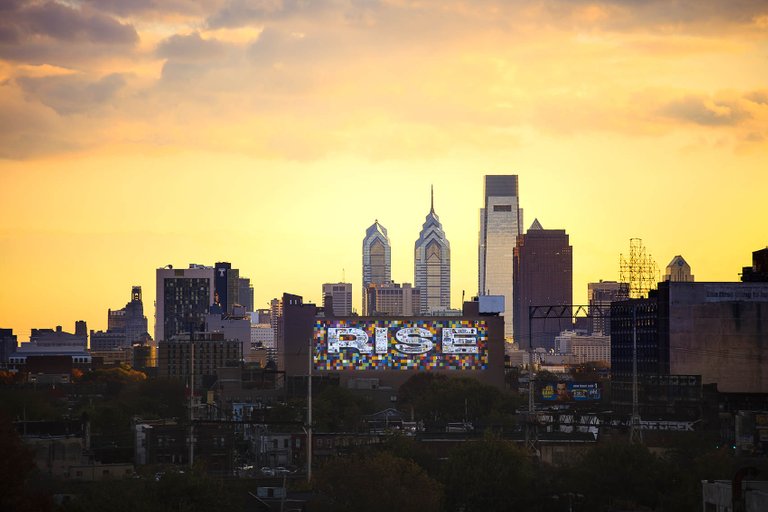Philadelphia is a city known for its rich history and iconic symbols like the Liberty Bell, Rocky, and the Love statue. Places like Independence Hall, the Constitution Center, and Museum of the American Revolution attract scores of visitors to sites of national significance. Although Philadelphia enjoys this national reputation, it is also a city filled with more personal stories and lived experiences that deserve more attention. National reverence for Philadelphia’s colonial and revolutionary past often overshadow those more personal stories, and underrepresented communities feel disconnected from the city’s local identity. Communities like North Philadelphia and Kensington are just as important to the city’s cultural fabric as the more iconic symbols, and we, as historians, should do more to collect and disseminate those stories.
 Photo by Steve Weinik of the North Philadelphia Beacon Project.
Photo by Steve Weinik of the North Philadelphia Beacon Project.
Although various archives across the city collect and preserve items relating to the social history of these communities, this top down approach may feel elite or unwelcoming to the everyday Philadelphians who contribute to the city’s unique identity. There should be a way to directly engage these underrepresented communities without relying on them visiting an archive or library to share their story. Instead of asking communities and individuals to visit an archive or other elite setting, I believe there should be an on-the-ground approach to collect these more local perspectives.
Philadelphia needs a grassroots mechanism that visits the various neighborhoods and hears their story. This speculative apparatus would conduct oral histories with the local residents and hear an unfiltered perspective of the city. It could also provide concrete services like the digitization of old family photographs or other personal papers in exchange for the rights to digitally archive the resources. Not only would this build a diverse archive of Philadelphia’s neighborhoods, but the participants would also receive a tangible takeaway.
If Philadelphia had an organization to collect these stories, perhaps the city’s identity would extend beyond the traditional narrative. This would generate a much needed sense of belonging for the single mothers and unemployed workers who contribute to their city’s narrative. It will send a direct message that, similar to Ben Franklin or Cecil B. Moore, their experiences also have historical significance.
This idea probably sounds very familiar to some of my colleagues in Temple’s Center for Public History. In 2013, Temple student Erin Bernard started the Philadelphia Public History Truck to explore local history and empathize with marginalized communities. Bernard’s efforts received extensive coverage in previous years, but additional resources are needed to advance the truck's mission and objectives. In tomorrow’s post, I will further explain why the Philly Public History Truck would be a good project to receive our collective Steem dollars. Stay tuned!

100% of the SBD rewards from this #explore1918 post will support the Philadelphia History Initiative @phillyhistory. This crypto-experiment conducted by graduate courses at Temple University's Center for Public History and MLA Program, is exploring history and empowering education. Click here to learn more.
Looking forward to your next post on what to support. I hope you get granular!
What a great idea! I never knew about the history truck before. Totally deserving of our funding!
Me, reading your post: "Hmm, this sounds just like the History Truck..."
Your post: "This idea probably sounds very familiar to some of my colleagues in Temple’s Center for Public History."
😂
Looking forward to your proposal!